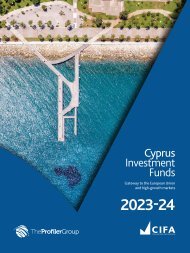2020 Cyprus Country Report
The 2020 Cyprus Country Report features in-depth articles on the economy, foreign direct investment, international trade and headquartering as well as detailed sector profiles and insights from Cyprus’ 100 most influential political, economic and business leaders shaping the future of their country and its industries.
The 2020 Cyprus Country Report features in-depth articles on the economy, foreign direct investment, international trade and headquartering as well as detailed sector profiles and insights from Cyprus’ 100 most influential political, economic and business leaders shaping the future of their country and its industries.
You also want an ePaper? Increase the reach of your titles
YUMPU automatically turns print PDFs into web optimized ePapers that Google loves.
Insurance<br />
Sector Profile<br />
fintech coming into the market is diversifying<br />
insurance covers into products, such as the employment<br />
of telematic devices, for instance. As<br />
demand has been rising for these and other types<br />
of policies, the <strong>Cyprus</strong> insurance industry has<br />
been quick to broaden the spectrum of services.<br />
The industry is also experiencing fresh momentum<br />
in the provision of second pillar occupational<br />
pension schemes as a result of a change in<br />
the law that enabled life companies to offer these<br />
types of products and clarified that the associated<br />
contributions are tax deductible. There has<br />
also been a resurgence in demand for insurance<br />
investment products. Insurance firms have been<br />
offering pillar II occupational pension schemes,<br />
known as Class 7 schemes, which are similar to the<br />
traditional provident funds but with more benefits,<br />
according to the IAC. These new schemes were introduced<br />
in <strong>Cyprus</strong> for the first time in 2016, and<br />
are growing to be a very promising alternative for<br />
pension-related saving and investing. The Class 7<br />
funds resemble classic provident funds set up by<br />
associations of professionals, unions and companies<br />
for their employees, but are managed by insurance<br />
companies and are governed by the legal<br />
framework regulating insurance companies. They<br />
can be flexible and more cost-effective products,<br />
suitable to all types of organisations regardless of<br />
size and sector. The evolution of class 7 products<br />
has brought drastic changes to <strong>Cyprus</strong>’ occupational<br />
pensions sector and is set to make an even<br />
bigger impact in the future, as they offer a convenient<br />
and hassle-free way to complement future<br />
social insurance pensions and constitute a taxadvantageous<br />
investment vehicle at a time when<br />
having money in the bank could prove to be costly.<br />
Another developing segment that is currently<br />
being refined is insurance coverage for high-rise<br />
developments, which requires more specialisation<br />
particularly now as <strong>Cyprus</strong> is experiencing<br />
a construction boom of skyscrapers, new luxury<br />
marinas, and big hotels. Insurance has an important<br />
role in these types of complicated projects<br />
with multiple phases and subcontractors, and<br />
insurers need to be involved in the entire process<br />
from start to finish to maintain the integrity of<br />
the cover and mitigate potential risks.<br />
ROBUST REGULATORY FRAMEWORK<br />
<strong>Cyprus</strong> is fully aligned with EU law as well as with<br />
legal frameworks stemming from other supranational<br />
organisations, such as the OECD, and<br />
offers a simple, straight-forward and transparent<br />
framework for business. However, increased<br />
pressure from new and complex regulation over<br />
the last several years has been a challenge faced<br />
by the financial services industry around the<br />
world. The surge of regulatory changes such as<br />
Solvency II, MiFID II, GDPR, PRIIPS Regulation<br />
and the Insurance Distribution Directive (IDD)<br />
meant that insurers had to use a great deal of their<br />
resources for regulatory compliance purposes. In<br />
addition, the immense task of the future implementation<br />
of IFRS17 by 2023, will place serious<br />
pressure on firms in terms of time, cost and<br />
human resources.<br />
The Solvency II <strong>2020</strong> review is on the agenda<br />
across the EU this year, pushed forward by the<br />
European Insurance and Occupational Pensions<br />
Authority (EIOPA). The Solvency II Directive<br />
is designed to face difficult situations of financial<br />
stress, by setting minimum solvency capital<br />
requirements and strict rules on the calculation<br />
of technical provisions. Although the industry<br />
in <strong>Cyprus</strong> is well equipped to appropriately<br />
transpose and implement new regulation to stay<br />
competitive in the EU market, the intense margin<br />
pressures and expense of regulatory burdens<br />
could give impetus to more consolidation in the<br />
market through mergers, acquisitions and strategic<br />
partnerships in the years ahead – especially<br />
due to the high number of companies competing<br />
in the local market.<br />
CHALLENGES AND OPPORTUNITIES<br />
Just like in many other economic sectors, digitalisation<br />
is key to staying competitive in the<br />
cut-throat insurance landscape. Traditional insurance<br />
companies have already completed, or<br />
are in the process of completing, their digital<br />
transformation, as they face growing competition<br />
from online insurance providers. Similarly to<br />
other industries, traditional big firms are placing<br />
strong emphasis on streamlining processes and<br />
implementing more efficient systems.<br />
On a macro level, <strong>Cyprus</strong> insurance experts<br />
would like to see a more defined long-term vision<br />
from the government on how the sector could<br />
be developed in the future. This would help the<br />
industry focus on building more niche segments<br />
that could attract further business and investment<br />
to <strong>Cyprus</strong> and facilitate sustainable development<br />
in the future. For example, <strong>Cyprus</strong> has not made<br />
much progress in developing reinsurance business,<br />
perhaps most importantly because the legislative<br />
changes to reform the market structure<br />
and make it more competitive and appealing for<br />
reinsurers – such as cell company formation –<br />
have not yet taken place. Creating a reinsurance<br />
industry in <strong>Cyprus</strong> would have multiple positive<br />
outcomes for the economy since it would create<br />
jobs and keep millions of euros in reinsurance<br />
premiums in <strong>Cyprus</strong>, which are currently paid to<br />
reinsurers abroad.<br />
A challenge the insurance industry has faced<br />
over the last year is the ongoing implementa-<br />
0.7%<br />
2019 growth in<br />
life premiums<br />
<strong>Cyprus</strong> offers multiple<br />
fiscal benefits for<br />
international business,<br />
such as easy market<br />
access and the<br />
services of a vast<br />
pool of professionals<br />
in the insurance<br />
and financial<br />
services industry.<br />
100 <strong>Country</strong> <strong>Report</strong> CYPRUS <strong>2020</strong>

















